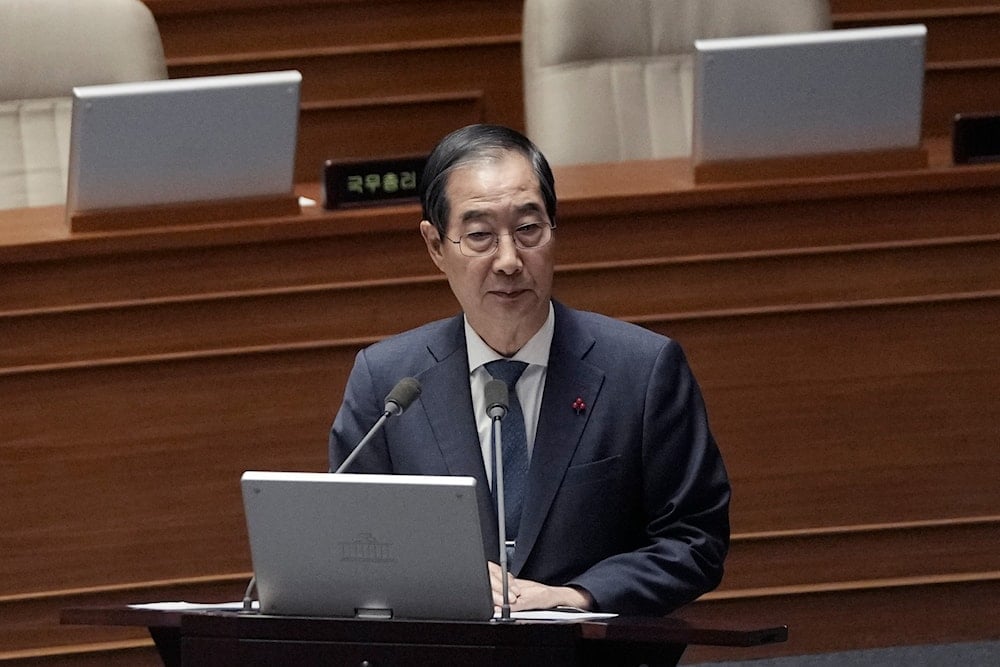South Korean lawmakers impeach Acting President Han Duck-soo
Finance Minister Choi Sang-mok will assume the role of acting president in Han's absence.
-

South Korean Prime Minister Han Duck-soo speaks during a plenary session relating to the martial law declaration, at the National Assembly in Seoul, South Korea, on December 11, 2024. (AP)
South Korean lawmakers impeached Acting President Han Duck-soo on Friday as the nation grapples with political instability stemming from his predecessor's shocking declaration of martial law.
Han became acting president after President Yoon Suk Yeol was suspended following a parliamentary vote on December 3, which was prompted by his decision to impose martial law.
However, opposition MPs called for Han's removal from office, citing his refusal to carry out the impeachment process against Yoon and bring him to justice, despite demands to do so.
"I announce that Prime Minister Han Duck-soo's impeachment motion has passed. Out of the 192 lawmakers who voted, 192 voted to impeach," stated National Assembly Speaker Woo Won-shik.
Counting for the impeachment was delayed as lawmakers from the ruling People's Power Party (PPP) protested in parliament after Woo declared that a simple majority in the 300-member legislature was sufficient to proceed with the impeachment.
PPP lawmakers began chanting angrily and many surged toward Woo, demanding his resignation. As a result, they refused to participate in the vote.
This marked the second impeachment of a South Korean head of state in just two weeks, further deepening the turmoil in the country's volatile political landscape. It was also the first impeachment of an acting president in South Korea's history.
Read next: South Korea's opposition pushes to impeach acting president
After the vote, PPP leader Kweon Seong-dong stated that Han "must continue to lead state affairs without yielding to the opposition's passage of the impeachment motion."
However, Han responded in a statement, saying he "respects the parliament's decision" and would await the Constitutional Court's ruling on whether to uphold it.
In its impeachment motion, the opposition accused Han of "intentionally avoiding the special investigation to probe those involved in the insurrection," adding that the acting president "has clearly stated his intention to reject the appointments of three Constitutional Court judges."
It emphasized that such actions were "in violation of a public official's duty to uphold the law... and serve the public."
Finance Minister Choi Sang-mok will assume the role of acting president in Han's absence. He had previously urged opposition lawmakers to refrain from pursuing the impeachment motion.
During a news conference with other cabinet members earlier on Friday, Choi said, "An impeachment motion against the acting authority is no different from an impeachment motion against the entire cabinet."
"Our economy and people's livelihoods, which are walking on thin ice in a national emergency, cannot bear the expansion of political uncertainty surrounding the acting authority," he added.
The central issue in the ongoing dispute revolves around the composition of the Constitutional Court, tasked with determining whether to uphold parliament's decision to impeach Yoon and, subsequently, Han.
Currently, the court operates with only six judges, three short of its full complement. Although it can proceed with the reduced bench, a single dissenting vote would result in Yoon's reinstatement.
The opposition had sought Han’s approval for three additional nominees to complete the nine-member bench, a request he declined, leaving both sides at an impasse.

 3 Min Read
3 Min Read








